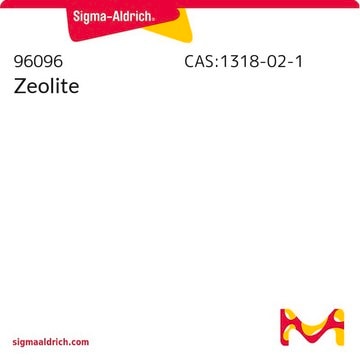793574
Sodium bromide
anhydrous, free-flowing, Redi-Dri™, ACS reagent, ≥99%
About This Item
Recommended Products
grade
ACS reagent
anhydrous
Quality Level
vapor pressure
1 mmHg ( 806 °C)
product line
Redi-Dri™
Assay
≥99%
form
powder
quality
free-flowing
impurities
≤0.005% insolubles
pH
5.0-8.8 (25 °C, 5%)
mp
755 °C (lit.)
anion traces
bromate (BrO3-): ≤0.001%
chloride (Cl-): ≤0.2%
sulfate (SO42-): ≤0.002%
cation traces
Ba: ≤0.002%
Ca: ≤0.002%
Fe: ≤5 ppm
K: ≤0.1%
Mg: ≤0.001%
heavy metals: ≤5 ppm (by ICP-OES)
SMILES string
[Na+].[Br-]
InChI
1S/BrH.Na/h1H;/q;+1/p-1
InChI key
JHJLBTNAGRQEKS-UHFFFAOYSA-M
Looking for similar products? Visit Product Comparison Guide
General description
Application
- Sensitive and Low-Noise Perovskite Nanocrystal-Organic Bulk Heterostructure X-ray Detectors Enabled by Sodium Bromide-Assisted In Situ Reparation: This research underscores the role of sodium bromide in enhancing the fabrication of perovskite nanocrystals for advanced X-ray detection technologies, illustrating its utility in high-precision imaging applications critical for both medical and industrial use (Li Y, Fang Y, 2024).
- Surface-Modified Carboxylated Cellulose Nanofiber Hydrogels for Prolonged Release of Polyhexamethylene Biguanide Hydrochloride (PHMB) for Antimicrobial Applications: Demonstrates the effectiveness of sodium bromide in modifying cellulose nanofibers for use in sustained drug release systems, highlighting its importance in the development of antimicrobial materials (O-Chongpian P, Jantrawut P, 2023).
- Unravelling Alkali-Metal-Assisted Domain Distribution of Quasi-2D Perovskites for Cascade Energy Transfer toward Efficient Blue Light-Emitting Diodes: Details the utilization of sodium bromide in the synthesis of quasi-2D perovskites, paving the way for improvements in blue light-emitting diode (LED) technology which is crucial for display and lighting solutions (Cai W, Yip HL, 2022).
- Chronic sodium bromide treatment relieves autistic-like behavioral deficits in three mouse models of autism: Highlights the potential therapeutic applications of sodium bromide in neuropsychiatric disorders, providing insights into its efficacy in alleviating symptoms of autism within experimental settings (Derieux C, Becker JAJ, 2022).
- Development of Flexible Plasticized Ion Conducting Polymer Blend Electrolytes Based on Polyvinyl Alcohol (PVA): Chitosan (CS) with High Ion Transport Parameters Close to Gel Based Electrolytes: Showcases the role of sodium bromide in the development of high-performance polymer electrolytes for energy storage applications, demonstrating its impact on enhancing ion transport properties (Sadiq NM, Kadir MFZ, 2022).
Legal Information
Signal Word
Warning
Hazard Statements
Precautionary Statements
Hazard Classifications
Repr. 2 - STOT RE 2 - STOT SE 3
Target Organs
Central nervous system
Storage Class Code
13 - Non Combustible Solids
WGK
WGK 1
Flash Point(F)
Not applicable
Flash Point(C)
Not applicable
Choose from one of the most recent versions:
Already Own This Product?
Find documentation for the products that you have recently purchased in the Document Library.
Customers Also Viewed
Articles
Redi-Dri™ prevents hygroscopic powders, such as inorganic salts, from absorbing moisture and forming clumps, leaving the salts free-flowing every time.
Redi-Dri™ prevents hygroscopic powders, such as inorganic salts, from absorbing moisture and forming clumps, leaving the salts free-flowing every time.
Redi-Dri™ prevents hygroscopic powders, such as inorganic salts, from absorbing moisture and forming clumps, leaving the salts free-flowing every time.
Redi-Dri™ prevents hygroscopic powders, such as inorganic salts, from absorbing moisture and forming clumps, leaving the salts free-flowing every time.
Our team of scientists has experience in all areas of research including Life Science, Material Science, Chemical Synthesis, Chromatography, Analytical and many others.
Contact Technical Service











